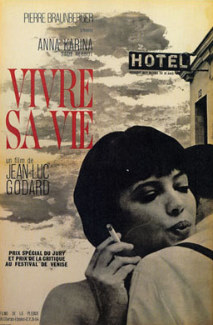Vivre Sa Vie
| My Life to Live | |
|---|---|

Theatrical poster
|
|
| Directed by | Jean-Luc Godard |
| Produced by | Pierre Braunberger |
| Written by |
Jean-Luc Godard Marcel Sacotte |
| Starring |
Anna Karina Sady Rebbot André S. Labarthe Guylaine Schlumberger Gérard Hoffman |
| Music by | Michel Legrand |
| Cinematography | Raoul Coutard |
| Edited by | Jean-Luc Godard Agnès Guillemot |
| Distributed by | Panthéon Distribution |
|
Release date
|
|
|
Running time
|
85 minutes |
| Country | France |
| Language | French |
| Budget | $40,000 |
My Life to Live (French: Vivre sa vie : film en douze tableaux; To Live Her Life: A Film in Twelve Scenes) is a 1962 French drama film directed by Jean-Luc Godard. It was released as My Life to Live in North America and as It's My Life in United Kingdom. The DVD releases use the original French title.
Nana (Anna Karina), a beautiful Parisian in her early twenties, leaves her husband and infant son hoping to become an actress. Without money, beyond what she earns as a shopgirl, and unable to enter acting, she elects to earn better money as a prostitute. Soon she has a pimp, Raoul, who after an unspecified period agrees to sell Nana to another pimp. During the exchange the pimps argue and Nana is killed in a gun battle. Nana's short life on film is told in 12 brief episodes each preceded by a written intertitle.
The film was shot in ten days for $40,000.
In Vivre sa vie, Godard borrowed the aesthetics of the cinéma vérité approach to documentary film-making that was then becoming fashionable. However, this film differed from other films of the French New Wave by being photographed with a heavy Mitchell camera, as opposed to the light weight cameras used for earlier films. The cinematographer was Raoul Coutard, a frequent collaborator of Godard.
One of the film's original sources is a study of contemporary prostitution, Où en est la prostitution by Marcel Sacotte, an examining magistrate.
Vivre sa vie was released shortly after Cahiers du cinéma (the film magazine for which Godard occasionally wrote) published an issue devoted to Bertolt Brecht and his theory of 'epic theatre'. Godard may have been influenced by it, as Vivre sa vie uses several alienation effects: twelve intertitles appear before the film's 'chapters' explaining what will happen next; jump cuts disrupt the editing flow; characters are shot from behind when they are talking; they are strongly backlit; they talk directly to the camera; the statistical results derived from official questionnaires are given in a voice-over; and so on.
...
Wikipedia
